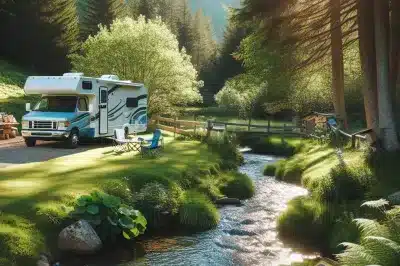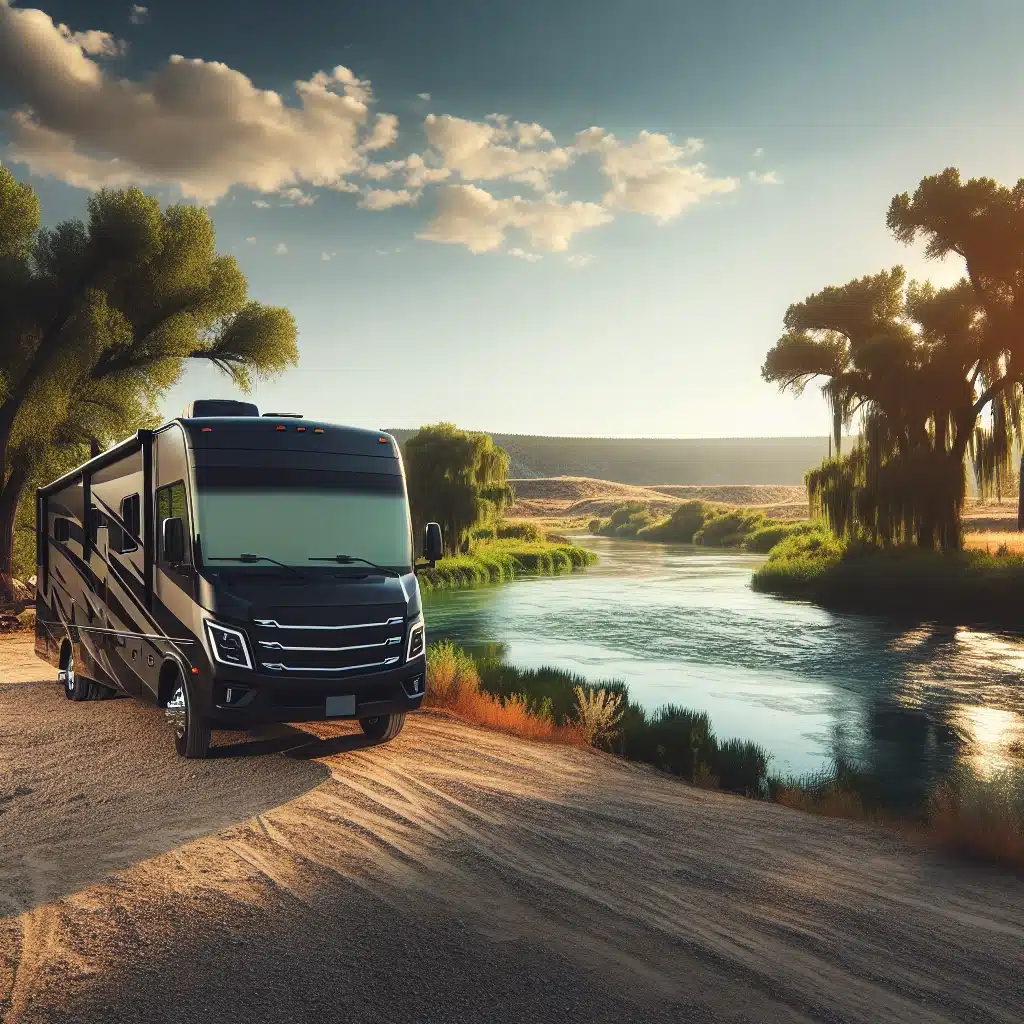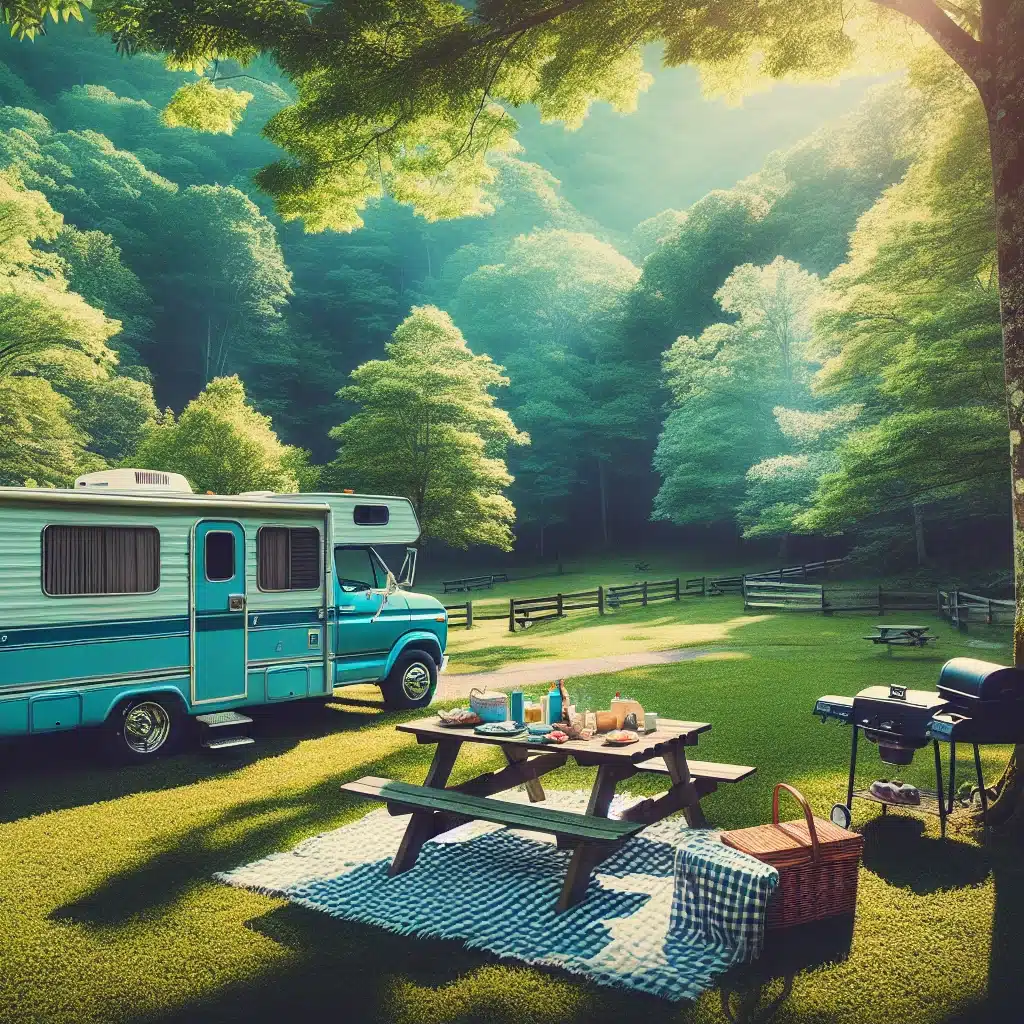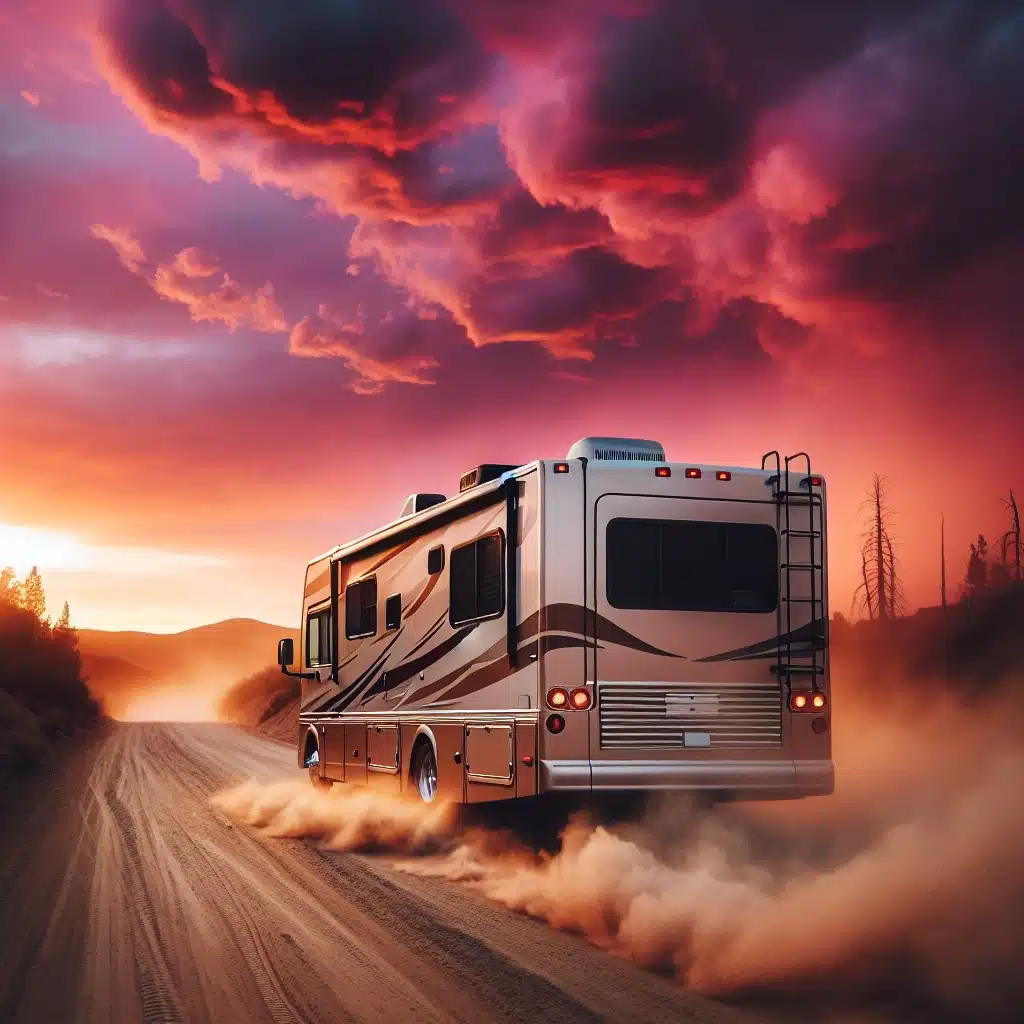Table of Contents

Harnessing the Sun: Your Ultimate Guide to Solar Power for RV Boondocking & Camping
Article-at-a-Glance
- Discover the essentials of choosing the right solar solution for your RV lifestyle.
- Learn about the key components that make up an RV solar system.
- Understand how solar power generation works and how to calculate your energy needs.
- Explore the top portable solar panels on the market for efficiency and portability.
- Get tips on maintaining your solar setup to ensure peak performance during your travels.
Selecting the Right Solar Solution for Your RV Adventures
Embarking on an RV adventure is all about freedom and self-sufficiency. Solar power is your ally on this journey, offering the independence to camp without hookups. But with so many options out there, how do you choose the best solar solution? Start by considering your energy usage, the size of your RV, and your travel habits. Whether you’re a weekend warrior or a full-time nomad, there’s a solar setup that’s just right for you. I’ll walk you through finding that perfect match.
The Anatomy of RV Solar Systems: Components and Configurations
An RV solar system is more than just panels on the roof. It’s a symphony of components working together to keep the lights on and your fridge cold. At its core, you’ll find solar panels, a charge controller, batteries, and an inverter. Each piece plays a critical role, and understanding how they fit together will help you build a system that meets your needs. Let’s break down these parts and talk about how to configure them for the best performance.
Solar Energy Basics for the Roving Camper
Understanding Solar Power Generation
Solar power is magic from the sun, captured and converted into electricity. It starts with solar panels, which use photovoltaic cells to turn sunlight into direct current (DC) electricity. From there, a charge controller regulates the flow of electricity to the batteries, ensuring they’re charged safely. Finally, an inverter transforms DC electricity into alternating current (AC), the type you use in your home. This is the power that runs your appliances and gadgets while you’re off the grid.
Calculating Your Energy Needs on the Road
Before diving into solar, it’s crucial to figure out how much energy you’ll need. Start by listing all the devices and appliances you use in your RV, noting how many watts they consume. Then, think about how many hours a day you’ll use each one. Multiply the watts by the hours, and voilà, you’ve got your daily watt-hour total. This number is your guiding star when choosing solar panels and batteries. Remember, it’s better to overestimate a bit to avoid running out of juice when you least expect it.

Top Portable Solar Panels
Panel Efficiency and Portability
When space is at a premium, and you’re constantly on the move, portable solar panels are a game-changer. They’re lightweight, easy to set up, and just as easy to pack away. But not all portable panels are created equal. Efficiency is key – it tells you how good a panel is at converting sunlight into electricity. The higher the efficiency, the less surface area you’ll need to meet your energy demands. I’ll show you some of the top performers that combine high efficiency with the convenience of portability.
Comparing the Leading Portable Solar Panel Models
When it comes to portable solar panels, there are a few frontrunners that RV enthusiasts swear by. Let’s compare some of the most popular models. We’ll look at their power output, durability, and ease of use. Some models, like the Renogy 100W Monocrystalline Foldable is a favorite for its high efficiency and portability. Others, such as the Goal Zero Nomad series, offer versatility with integrated USB ports. We’ll weigh the pros and cons, so you can pick a panel that’s as ready for adventure as you are.
Rooftop Solar Setups for Long-Term Energy Independence
For those who dream of endless travel with no need for shore power, a rooftop solar setup is the way to go. This more permanent solution means you can harness more sunlight and generate more power. It’s an investment in long-term energy independence, allowing you to live and travel with minimal impact on the environment.
Criteria for Choosing Rooftop Solar Panels
Choosing the right rooftop solar panels for your RV is about more than just wattage. You’ll want to consider the panel’s size, weight, and how it will mount to your RV’s roof. Look for durable panels that can withstand the rigors of the road, including resistance to weather and potential impact. The efficiency of the panels is also critical, as you’ll have limited space on your roof. And don’t forget to check the warranty – it can tell you a lot about the manufacturer’s confidence in their product.
Installation Tips for a Secure and Efficient Solar System
Installing rooftop solar panels can seem daunting, but with the right approach, it’s a manageable project. First, ensure your RV’s roof can support the weight and size of the panels. Use mounting brackets that are designed for the curve and material of your RV’s roof. Seal all the holes and edges to prevent leaks. And most importantly, position the panels where they’ll get maximum sunlight, away from shadows cast by other rooftop equipment.

Solar Generators: Powering Your RV with Stored Sunlight
Solar generators are a fantastic complement to solar panels, especially for those cloudy days when the sun is playing hide and seek. They store energy captured by your panels, ready to power your RV whenever you need it.
How Solar Generators Work
Solar generators are essentially large batteries that store energy from your solar panels. They come with charge controllers and inverters built-in, so they’re ready to go right out of the box. When your panels collect sunlight and convert it to electricity, the generator stores it until you’re ready to use it. This means you can have power at night or during inclement weather when your panels aren’t producing.
Matching a Solar Generator to Your RV’s Power Requirements
Not all solar generators are created equal, and choosing the right one is crucial. Start by looking back at your energy needs calculation. Your generator should have enough capacity to store at least a couple of days’ worths of electricity, just in case. Also, consider the generator’s output ports – make sure there are enough for all your devices and that they match the types of plugs you need.
The Best Solar Kit Configurations for Various RV Sizes
Different RV sizes and styles call for different solar solutions. A small pop-up camper won’t have the same energy needs as a large, luxury Class A motorhome. Here’s how to tailor your solar kit to your specific RV size and style.
Compact RV Solar Solutions
For smaller RVs, space is at a premium, but that doesn’t mean you have to skimp on solar power. Look for compact, high-efficiency panels that make the most of limited roof space. A portable solar kit can also be a great choice, as it allows you to position the panels where they’ll get the best sun exposure. A smaller solar generator can round out your system, ensuring you have power when you need it without taking up too much space.
Full-Size RV Solar Power Systems
For those with larger RVs, solar power systems can be a robust source of energy. With more roof space, you can install enough solar panels to potentially eliminate the need for external power sources. A full-size system typically includes a series of high-wattage panels, a substantial battery bank, and a powerful inverter to handle all your appliances. This setup is ideal for long-term travelers who value the freedom to camp anywhere, from remote wilderness areas to bustling cities, without worrying about power availability.

Charging on the Go: Foldable and Flexible Solar Solutions
Advantages of Flexible Solar Panels
Flexible solar panels are a revelation for RVers who are concerned about weight and aerodynamics. These panels are lightweight and can bend to conform to the contours of your RV’s roof, reducing drag and preserving your vehicle’s sleek look. They’re also durable and less prone to cracking than traditional glass panels. With an easy installation process that often involves simple adhesives, flexible solar panels are becoming a popular choice for those who seek both efficiency and convenience.
Foldable Panels for Efficient Storage and Transport
Foldable solar panels are your go-to option when you need power in a pinch. They can be unfolded and set up in minutes, capturing the sun’s rays whether you’re parked in a campsite or stopped for a midday break in the wilderness. When it’s time to hit the road, they fold up neatly, taking up minimal space. This portability makes them perfect for RVers who may not want permanent installations on their vehicles or who need the flexibility to chase the sunlight.
Maintaining Your Solar System for Peak Performance
Regular Maintenance Tasks
To ensure your solar system continues to provide reliable power, regular maintenance is key. This involves cleaning your solar panels to remove dust, dirt, and debris that can block sunlight and reduce efficiency. You should also check the connections and cables for signs of wear or damage and ensure that your batteries are kept at the recommended charge levels. A well-maintained solar system not only performs better but also lasts longer, saving you money and hassle in the long run.
Troubleshooting Common Solar Power System Issues
Even the best solar systems can encounter issues. Common problems include decreased power output, which could be due to dirty panels, shading, or equipment faults. If your system isn’t charging properly, check the charge controller settings and connections. Batteries that don’t hold a charge might need equalizing or replacing. By familiarizing yourself with these common issues and how to address them, you’ll be well-equipped to keep your system running smoothly.

Integrating Solar Power with Your RV’s Electrical System
Safety First: Electrical Integration Do’s and Don’ts
When integrating solar power with your RV’s electrical system, safety should be your top priority. Do consult a professional if you’re unsure about any aspect of the installation. Do use proper fuses and breakers to protect against electrical fires. Don’t mix and match different types of batteries, as this can lead to charging issues and reduced battery life. And don’t forget to secure all wiring to prevent damage from vibrations while on the move. By following these guidelines, you’ll ensure a safe and efficient solar setup.
Enhancing Your System with Inverters and Charge Controllers
Think of inverters and charge controllers as the brains of your solar setup. An inverter takes the DC power from your panels and turns it into AC power, which is what your RV appliances use. A good inverter can make this process super-efficient, meaning more power for your toast and TV time. Charge controllers manage the flow of electricity to the batteries, protecting them from overcharging and helping them last longer. They’re like a smart security guard for your power system, always making sure everything’s running smoothly.
Staying Powered Through Cloudy Days: Backup Solutions
The Role of Battery Banks
Battery banks are your energy reservoirs, storing power for when the sun’s taking a break. The bigger your battery bank, the more power you have tucked away for a rainy day. It’s like having a pantry full of snacks for when the grocery store’s closed. You’ll want to size your battery bank based on your energy needs and how long you plan to go without sunshine. With enough stored power, you can keep your lights on and your fridge humming, no matter what the weather’s doing.
Supplemental Power: When to Use Generators and Alternatives
Sometimes, the sun just isn’t enough, especially during extended bad weather or if you have high power needs. That’s when generators and alternative power sources come in handy. A generator can give you a power boost, but it’s a bit like calling in a noisy friend to help move furniture—it gets the job done, but there’s a cost in fuel and peace. Other alternatives include wind turbines or even hooking up to shore power when available. It’s all about having options so you can stay powered up no matter what.
Walkthrough: Setting Up Your RV Solar Power System
Step-by-Step Guide to Installing Portable Solar Panels
Setting up portable solar panels is a breeze, and I’ll show you how. First, find a sunny spot and lay out your panels so they face the sun. Connect the cables to your charge controller, then hook it up to your battery bank. Make sure all connections are tight and secure. Finally, angle the panels as the sun moves across the sky to soak up maximum rays. It’s like putting out a picnic blanket—just spread it out, and you’re good to go.
Professional Installation vs. DIY: What’s Best for You?
Installing a solar system can be a fun project, but it’s not for everyone. If you’re handy and have a good understanding of electrical systems, DIY can save you money. But if the thought of wiring makes you nervous, or you’d rather be exploring than reading instruction manuals, it might be worth calling in the pros. They can ensure everything’s set up safely and efficiently, so you can hit the road with confidence.
Eco-Friendly Travel: The Environmental Impact of Solar RVing
Reducing Your Carbon Footprint with Renewable Energy
By powering your RV with the sun, you’re doing Mother Nature a solid. Solar power is clean, green, and doesn’t belch out pollutants like a generator. It’s like choosing a bike over a car for your commute—you’re getting where you need to go without leaving a trail of smog. Plus, the more RVers that go solar, the less we rely on noisy, smelly generators. It’s a win for the planet and a win for our ears and noses, too.
Campground Etiquette and Leaving No Trace
When you’re out enjoying the great outdoors, it’s important to be a good neighbor and caretaker of the environment. Using solar power helps with this, as it’s quiet and doesn’t produce the exhaust that generators do. But there’s more to it than just the type of power you use. Always follow campground rules, be considerate of other campers, and leave your site just as you found it, if not better. This means packing out all your trash and making sure your solar setup doesn’t damage the landscape. It’s all about respecting nature and ensuring it stays pristine for the next adventurers.
Extend Your Journey: The Long-Term Benefits of RV Solar Power
Embracing solar power for your RV isn’t just about the convenience of having power wherever you park. It’s an investment in your freedom and the longevity of your travels. Solar panels have no moving parts, which means they’re low maintenance and can last for decades. The sun’s energy is free, so once you’ve recouped the initial cost, your power bills plummet. And as solar technology improves, you’ll find your system becomes even more efficient over time. In short, solar power can help you travel further, for longer, and with less impact on your wallet and the world.
Frequently Asked Questions (FAQ)
How many solar panels do I need for my RV?
The number of solar panels you’ll need depends on your energy usage. Remember that calculation we did earlier? That’s going to be your guide. A typical panel might produce around 30 kWh per month, but this can vary widely based on size, efficiency, and how much sun you get. A small RV might get by with one or two panels, while a larger setup could need four or more. It’s all about matching your energy needs with the production capacity of your panels.
Can I install solar panels on my RV myself?
Yes, you can install solar panels on your RV yourself if you’re comfortable with basic tools and electrical concepts. Many solar kits come with instructions that are pretty straightforward. Just make sure to follow them closely and prioritize safety. If you’re ever in doubt, though, there’s no shame in getting a professional to do it. They can ensure everything’s installed correctly and safely, giving you peace of mind as you travel.
How long do RV solar power systems typically last?
Solar panels are known for their longevity, often lasting 25 to 30 years or more. The batteries and other components may need to be replaced more frequently, but with proper maintenance, your system as a whole can serve you well for decades. It’s a long-term investment that pays off in energy savings and the satisfaction of self-sufficient travel.
Will solar power affect where I can park my RV?
Not really. In fact, it might open up more options for you. With solar power, you’re not reliant on hookups, so you can enjoy more remote, ‘off-the-beaten-path’ locations. The only consideration is sunlight—you’ll want to park where your panels can get plenty of it. But as long as you’re not obstructing traffic or breaking any rules, you can enjoy the freedom solar power brings.
In conclusion, solar power is more than just an energy source for your RV—it’s a ticket to freedom, adventure, and peace of mind. It’s an investment in a cleaner environment and a quieter, more self-sufficient way of life. Whether you’re a weekend camper or a full-time road warrior, solar power can enhance your RV experience in countless ways. So why not harness the power of the sun and hit the road with confidence? The world is waiting, and with solar power, you’re ready for it.
- Boondocking RVs: Flexible Solar Solutions – 3 March 2024
- Renewable Energy Tips for Full-Time Boondocking RVers – 2 March 2024
- Boondocking Solar Power Systems: Sizing Options & Solutions for Motorhomes – 1 March 2024
